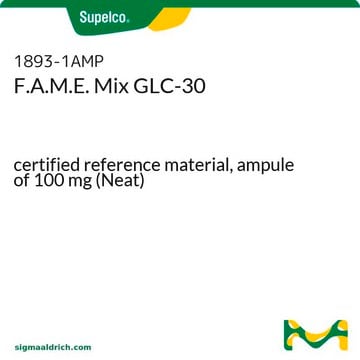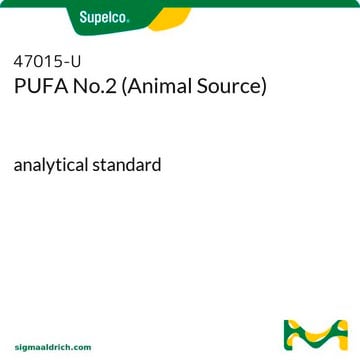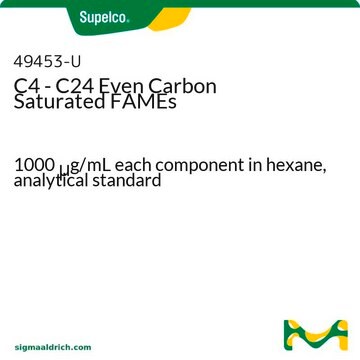18912-1AMP
F.A.M.E Mix, C20:1-C20:5 Unsaturates
certified reference material, (approx 25% (by weight) each component), ampule of 40 mg ((Neat)
Synonym(s):
Fatty Acid Methyl Ester Mix
Sign Into View Organizational & Contract Pricing
All Photos(1)
About This Item
UNSPSC Code:
85151701
NACRES:
NA.24
grade
certified reference material
TraceCERT®
product line
TraceCERT®
CofA
current certificate can be downloaded
packaging
ampule of 40 mg ((Neat)
concentration
(approx 25% (by weight) each component)
technique(s)
HPLC: suitable
gas chromatography (GC): suitable
application(s)
food and beverages
format
multi-component solution
functional group
carboxylic acid
ester
shipped in
dry ice
storage temp.
−20°C
Application
It was used in analysing fatty acid methyl esters using GC method, in a study which was performed to understand manipulation of oil synthesis in Nannochloropsis strain NIES-2145 with a phosphorus starvation–inducible promoter from Chlamydomonas reinhardtiiI.
Refer to the product′s Certificate of Analysis for more information on a suitable instrument technique. Contact Technical Service for further support.
Other Notes
This Certified Reference Material (CRM) is produced and certified in accordance with ISO 17034 and ISO/IEC 17025. All information regarding the use of this CRM can be found on the certificate of analysis.
Legal Information
TraceCERT is a registered trademark of Merck KGaA, Darmstadt, Germany
Analyte
Description
cis-11-Eicosenoic acid methyl ester ~ 10 mg
cis-11,14-Eicosadienoic acid methyl ester ~ 10 mg
cis-5,8,11,14-Eicosatetraenoic acid methyl ester ~ 10 mg
cis-5,8,11,14,17-Eicosapentaenoic acid methyl ester ~ 10 mg
Signal Word
Warning
Hazard Statements
Precautionary Statements
Hazard Classifications
Eye Irrit. 2 - Skin Irrit. 2
Storage Class Code
11 - Combustible Solids
WGK
WGK 3
Flash Point(F)
Not applicable
Flash Point(C)
Not applicable
Choose from one of the most recent versions:
Already Own This Product?
Find documentation for the products that you have recently purchased in the Document Library.
Customers Also Viewed
Paula Monllor et al.
Animals : an open access journal from MDPI, 10(2) (2020-02-27)
Artichoke by-products represent a high amount of waste whose removal entails several costs. Moreover, feed is the main cost in a farm. So, including these by-products in ruminant diets would lower feed costs. Two experiments were conducted to evaluate the
Meng Xie et al.
PLoS genetics, 11(6), e1005284-e1005284 (2015-06-18)
AMP-activated kinase (AMPK) is a key regulator of many cellular mechanisms required for adjustment to various stresses induced by the changing environment. In C. elegans dauer larvae AMPK-null mutants expire prematurely due to hyperactive Adipose Triglyceride Lipase (ATGL-1) followed by
Paula Monllor et al.
Foods (Basel, Switzerland), 9(6) (2020-06-05)
In the Mediterranean region, artichoke and broccoli are major crops with a high amount of by-products that can be used as alternative feedstuffs for ruminants, lowering feed costs and enhancing milk sustainability while reducing the environmental impact of dairy production.
Paula Monllor et al.
Animals : an open access journal from MDPI, 10(9) (2020-09-20)
The aim of this experiment was to study the effects of a 40% inclusion of broccoli by-product (BB) and artichoke plant (AP) silages in dairy goat diets on the milk yield, composition and animal health status during a full lactation.
Masako Iwai et al.
Frontiers in microbiology, 6, 912-912 (2015-10-07)
Microalgae accumulate triacylglycerols (TAGs) under conditions of nutrient stress. Phosphorus (P) starvation induces the accumulation of TAGs, and the cells under P starvation maintain growth through photosynthesis. We recently reported that P starvation-dependent overexpression of type-2 diacylglycerol acyl-CoA acyltransferase (CrDGTT4)
Our team of scientists has experience in all areas of research including Life Science, Material Science, Chemical Synthesis, Chromatography, Analytical and many others.
Contact Technical Service


